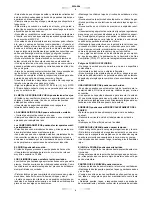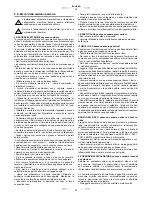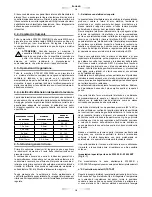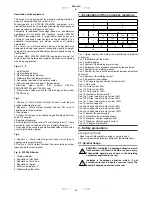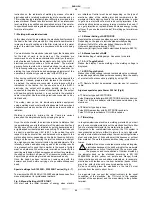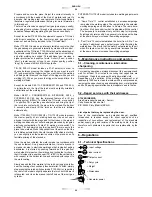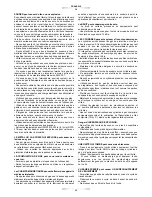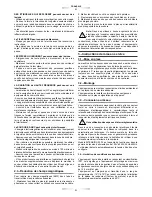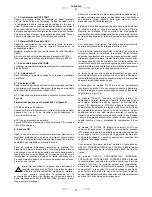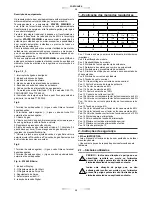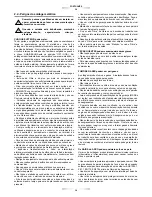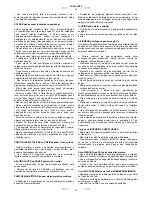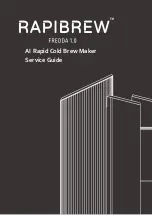
ENGLISH
23
23
• Do not use welder to thaw frozen pipes.
• Remove stick electrode from holder or cut off welding wire at
contact tip when not in use.
• Wear oil free protective garments such as leather gloves, heavy
shirt, cuffless trousers, high shoes, and a cap.
• Remove any combustibles, such as a butane lighter or
matches,from your person before doing any welding.
• After completion of work, inspect area to ensure it is free of
sparks,glowing embers, and flames.
• Use only correct fuses or circuit breakers. Do not oversize or
bypass them.
• Follow requirements in OSHA 1910.252 (a) (2) (iv) and NFPA
51Bfor hot work and have a fire watcher and extinguisher nearby.
FLYING METALor DIRT can injure eyes.
• Welding, chipping, wire brushing, and grindingcause sparks
and flying metal. As welds cool,they can throw off slag.
• Wear approved safety glasses with sideshields even under
your welding helmet.
BUILDUPOF GAS can injure or kill.
• Shut off shielding gas supply when not in use.
• Always ventilate confined spaces or useapproved air supplied
respirator.
MAGNETIC FIELDS can affect ImplantedMedical Devices.
• Wearers of Pacemakers and other ImplantedMedical Devices
should keep away.
• Implanted Medical Device wearers should consult their
doctorand the device manufacturer before going near arc
welding, spotwelding, gouging, plasma arc cutting, or induction
heating operations.
NOISE can damage hearing.
Noise from some processes or equipment candamage hearing.
• Wear approved ear protection if noise level is high.
CYLINDERS can explode if damaged.
Shielding gas cylinders contain gas under highpressure. If
damaged, a cylinder can explode. Sincegas cylinders are
normally part of the weldingprocess, be sure to treat them
carefully.
• Protect compressed gas cylinders from excessive heat,
mechanical shocks, physical damage, slag, open flames, sparks,
and arcs.
• Install cylinders in an upright position by securing to a
stationarysupport or cylinder rack to prevent falling or tipping.
• Keep cylinders away from any welding or other electrical
circuits.
• Never drape a welding torch over a gas cylinder.
• Never allow a welding electrode to touch any cylinder.
• Never weld on a pressurized cylinder - explosion will result.
• Use only correct shielding gas cylinders, regulators, hoses, and
fittings designed for the specific application; maintain them and
associated parts in good condition.
• Turn face away from valve outlet when opening cylinder valve.
• Keep protective cap in place over valve except when cylinder is
inuse or connected for use.
• Use the right equipment, correct procedures, and sufficient
number of persons to lift and move cylinders.
• Read and follow instructions on compressed gas
cylinders,associated equipment, and Compressed Gas
Association (CGA)publication P-1 listed in Safety Standards.
FIRE OR EXPLOSION hazard.
• Do not install or place unit on, over, or nearcombustible
surfaces.
• Do not install unit near flammables.
• Do not overload building wiring - be sure power supply system
is properly sized, rated, and protected to handle this unit
FALLING UNIT can cause injury.
• Use lifting eye to lift unit only, NOT runninggear, gas cylinders,
or any other accessories.
• Use equipment of adequate capacity to lift andsupport unit.
• If using lift forks to move unit, be sure forks arelong enough to
extend beyond opposite side ofunit.
OVERUSE can cause OVERHEATING
• Allow cooling period; follow rated duty cycle.
• Reduce current or reduce duty cycle beforestarting to weld
again.
• Do not block or filter airflow to unit.
FLYING SPARKS can cause injury.
• Wear a face shield to protect eyes and face.
• Shape tungsten electrode only on grinder withproper guards in
a safe location wearing properface, hand, and body protection.
• Sparks can cause fires — keep flammables away.
MOVING PARTS can cause injury.
• Keep away from moving parts.
• Keep away from pinch points such as driverolls.
WELDING WIRE can cause injury.
• Do not press gun trigger until instructed to doso.
• Do not point gun toward any part of the body,other people, or
any metal when threading welding wire.
MOVING PARTS can cause injury.
• Keep away from moving parts such as fans.
• Keep all doors, panels, covers, and guardsclosed and securely
in place.
• Have only qualified persons remove doors, panels, covers, or
guards for maintenance as necessary.
• Reinstall doors, panels, covers, or guards when maintenance
is finished and before reconnecting input power.
H.F. RADIATION can cause interference.
• High-frequency (H.F.) can interfere with radionavigation, safety
services, computers, andcommunications equipment.
• Have only qualified persons familiar withelectronic equipment
perform this installation.
• The user is responsible for having a qualified electrician
promptly correct any interference problem resulting from the
installation.
• Have the installation regularly checked and maintained.
• Keep high-frequency source doors and panels tightly shut, keep
spark gaps at correct setting, and use grounding and shielding
tominimize the possibility of interference.
ARC WELDING can cause interference.
• Electromagnetic energy can interfere withsensitive electronic
equipment such ascomputers and computer-driven equipment
such as robots.
• Be sure all equipment in the welding area iselectromagnetically
compatible.
• To reduce possible interference, keep weld cables as short as
possible, close together, and down low, such as on the floor.
• Locate welding operation 100 meters from any sensitive
electronic equipment.
• Be sure this welding machine is installed and grounded
according to this manual.
• If interference still occurs, the user must take extra measures
such as moving the welding machine, using shielded cables,using
line filters, or shielding the work area.

